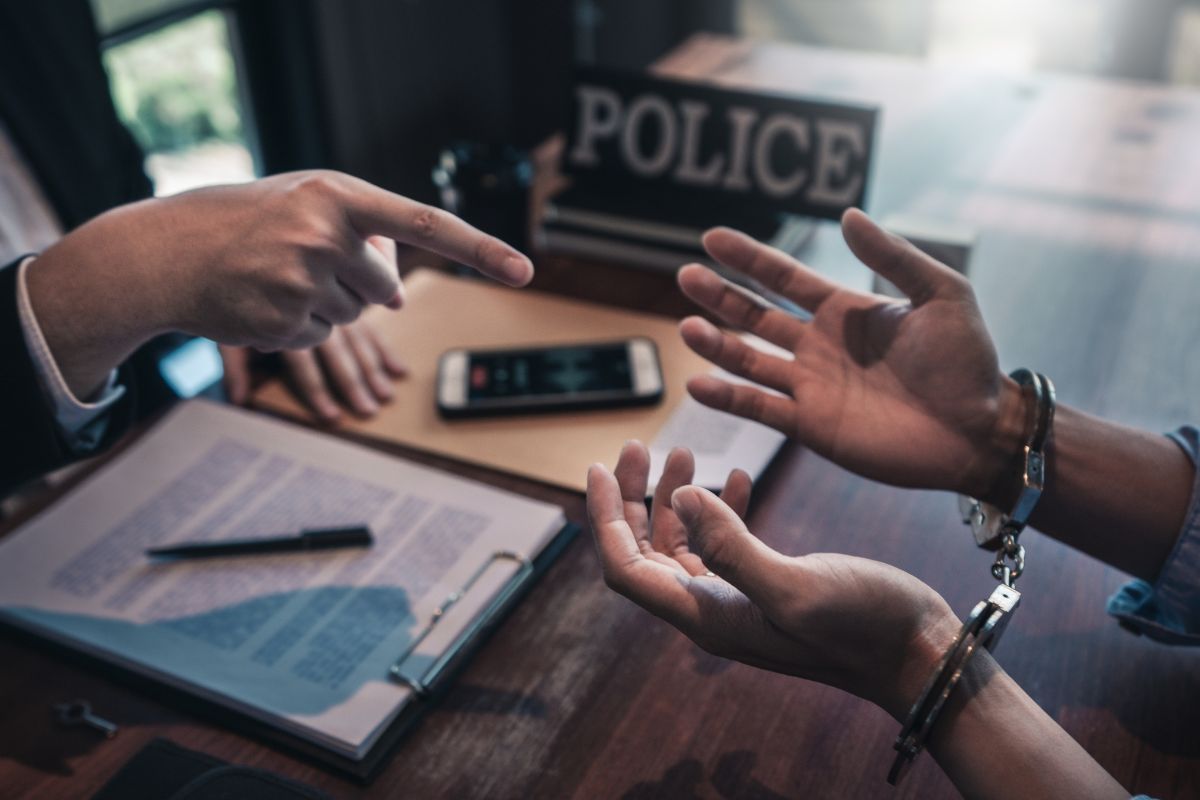 When facing police questioning, the line between a casual conversation and an official interrogation can blur quickly, often leaving individuals unsure of their rights. In Arizona, protecting yourself during an interrogation is critical to ensuring that your words aren’t used against you. This article will provide a detailed, step-by-step breakdown of recognizing an interrogation, what actions to take, and why staying silent isn’t always enough.
When facing police questioning, the line between a casual conversation and an official interrogation can blur quickly, often leaving individuals unsure of their rights. In Arizona, protecting yourself during an interrogation is critical to ensuring that your words aren’t used against you. This article will provide a detailed, step-by-step breakdown of recognizing an interrogation, what actions to take, and why staying silent isn’t always enough.
Interrogation vs. Conversation: How to Tell the Difference
 Law enforcement sometimes starts a conversation casually, making it seem like an informal chat. This can create confusion about when you’re being interrogated. So, what is the difference? The key lies in the intent of the conversation and your status during it.
Law enforcement sometimes starts a conversation casually, making it seem like an informal chat. This can create confusion about when you’re being interrogated. So, what is the difference? The key lies in the intent of the conversation and your status during it.
An interrogation happens when law enforcement asks questions to gather evidence or information that could be used against you. You might not even be under arrest yet. If you feel pressure to provide answers or the officer’s questions are focused on uncovering guilt, you are likely in an interrogation—even if they haven’t read you your Miranda rights yet.
The crucial point is recognizing when to be on guard. If the conversation shifts to questions about your whereabouts, actions, or involvement in a crime, you will likely move from a conversation to an interrogation. Understanding this difference is the first step to protecting yourself.
Silent But Smart: Why Staying Quiet Isn’t Always Enough
 You’ve likely heard the phrase, “You have the right to remain silent.” While true, staying silent might not protect you as effectively as you think. Silence alone won’t always stop law enforcement from pushing harder for answers, and it can sometimes be misconstrued as non-cooperation.
You’ve likely heard the phrase, “You have the right to remain silent.” While true, staying silent might not protect you as effectively as you think. Silence alone won’t always stop law enforcement from pushing harder for answers, and it can sometimes be misconstrued as non-cooperation.
That’s why it’s essential to remain quiet and assert your rights by stating, “I am invoking my right to remain silent, and I want an attorney.” This firm and clear statement tells law enforcement you know your rights and will not engage without legal protection.
It’s also critical to remain polite but firm. While you might want to avoid conflict, being passive can lead law enforcement to believe they can pressure you into talking. Remember, silence can only protect you if you actively invoke it.
Interrogation Myths That Could Hurt Your Case
Many people walk into police questioning with misconceptions, often due to misinformation from TV dramas or movies. A common myth is, “I can talk my way out of this.” Even innocent statements can be twisted, misinterpreted, or used out of context.
Another common belief is that you should be fully cooperative to demonstrate that you have nothing to hide. While cooperation with law enforcement is important, it’s also essential to recognize that answering questions without legal guidance can put you in a vulnerable position. Don’t assume that answering a few harmless questions will clear your name; it might build a case against you.
Legal Loopholes in Interrogations: What You Should Know
 Even if you feel confident in your ability to handle police questioning, there are legal loopholes that can catch you off guard. Police officers are trained to use tactics that exploit your lack of knowledge, such as asking leading questions or implying that not cooperating will lead to harsher consequences.
Even if you feel confident in your ability to handle police questioning, there are legal loopholes that can catch you off guard. Police officers are trained to use tactics that exploit your lack of knowledge, such as asking leading questions or implying that not cooperating will lead to harsher consequences.
In Arizona, law enforcement is not required to inform you of your rights immediately. For example, you might only be read your Miranda rights if you’re formally in custody and being interrogated. This is why requesting an Arizona criminal defense attorney is crucial when you suspect you’re being questioned about a crime.
The Trap of “Just Answering a Few Questions”
One of the most common traps people fall into is thinking, “I’ll just answer a few questions, and it’ll all go away.” This is exactly what law enforcement hopes for. They often approach individuals by asking routine or simple questions, but these “routine” questions are designed to elicit key information that can strengthen a case against you.
Once you start answering, you open up to more in-depth questioning. Before you know it, you’re providing answers to questions you weren’t prepared for, and these responses can be taken out of context. The safest route is to wait to answer questions until you’ve spoken to an attorney. This is especially true if the officer says, “This will just take a minute,” or “We just need to clear a few things up.” Your right to an attorney exists even if you think the questioning is informal.
What Happens If You Say the Wrong Thing
 Even a small misstatement can have serious consequences. In the high-stakes environment of criminal investigations, law enforcement will analyze every word you say, looking for inconsistencies or admissions of guilt. You might think you’re providing clarification, but in reality, you’re creating opportunities for law enforcement to build a case against you.
Even a small misstatement can have serious consequences. In the high-stakes environment of criminal investigations, law enforcement will analyze every word you say, looking for inconsistencies or admissions of guilt. You might think you’re providing clarification, but in reality, you’re creating opportunities for law enforcement to build a case against you.
Additionally, once you’ve said something that could be harmful to your defense, it’s almost impossible to take it back. These statements become part of the official record and can be used against you in court. This is why it’s critical to stay silent and avoid discussing details of your case without an attorney.
Steps to Take Before, During, and After an Interrogation
To protect your rights, it’s essential to have an action plan. First, if you know you may be involved in an investigation, contact an Arizona criminal defense attorney immediately. Having legal representation from the start ensures that you’re prepared if law enforcement comes calling.
During an interrogation, your best option is to remain calm, clearly state that you’re invoking your right to remain silent, and request your attorney. Avoid answering any questions, even those that seem unrelated or harmless.
Finally, if you’ve been questioned without legal representation, contact an attorney immediately to review the details of your case and any statements you may have made. A defense lawyer can help you mitigate potential damage and build a strong defense.
The Importance of Legal Representation
Interrogations are not just casual conversations; they are designed to gather evidence, often at your expense. Knowing your rights, recognizing when you’re being interrogated, and having an experienced attorney are critical to protecting yourself from costly mistakes. Staying silent alone isn’t enough—invoking your right to an attorney and avoiding common pitfalls can make all the difference in the outcome of your case.
If you’re facing police questioning, take your time with your future. Reach out to an experienced Arizona criminal defense attorney at AZ Legal. Our team will ensure that your rights are protected every step of the way. Contact us today for the legal guidance you need before it’s too late.





